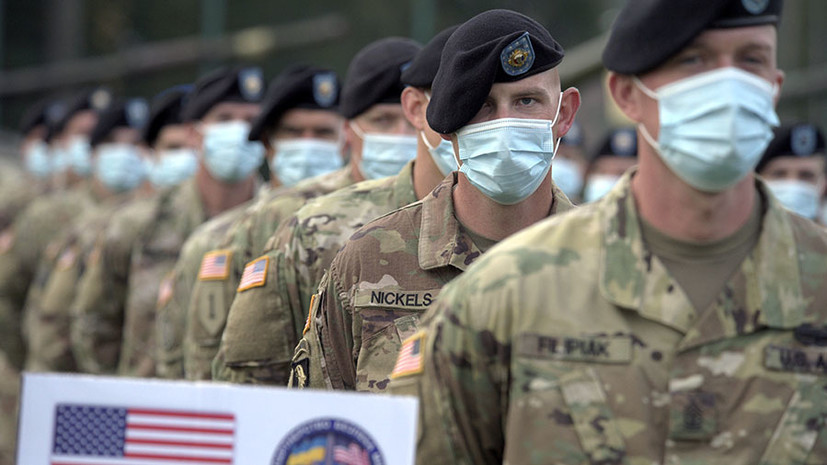The Russian Foreign Ministry said that the United States, instead of trying to focus on answers to questions posed by Russian diplomats, is conducting an information and propaganda campaign against Russia.
"The White House and its Western allies have launched a highly toxic information and propaganda campaign that portrays our country as an 'aggressor', an 'enemy of civilized Europe' and a 'threat' to international stability," the Foreign Ministry said in a publication on the facts of disinformation about Russian 'aggression'. in Ukraine.
Earlier, the US State Department published material about allegedly Russian disinformation on the situation around Ukraine.
As Russian Foreign Ministry spokeswoman Maria Zakharova commented on these materials, the document contains "passages of simply inhuman lies."
Russian diplomats also noted that the US-initiated campaign is accompanied by "continuous intimidation of 'painful' sanctions designed to bleed the domestic economy and reinforce Russia's systemic challenge."
As emphasized in the Russian Foreign Ministry, since the receipt of Russian proposals on security guarantees, the American side has mainly tried to drag out the negotiations, despite the specific parameters proposed by Russia for various expert levels and formats.
Recall that on December 17, the Russian Foreign Ministry published draft treaties with the United States and agreements with NATO on security guarantees.
Among other things, the documents contain provisions on the non-deployment of intermediate-range and shorter-range missiles within each other's reach, mutual security guarantees in Europe, and the refusal to further expand NATO, including at the expense of the former Soviet republics.
In early January, Russia held a series of talks with the US and NATO on these issues, which continued with a meeting between Foreign Minister Sergei Lavrov and US Secretary of State Anthony Blinken in Geneva on January 21.
During the meeting, an agreement was reached that the United States would send written responses to Russia's proposals next week.
The Foreign Ministry’s statement following the meeting also says that Blinken was “clearly informed” that ignoring Russia’s concerns related to the military development of Ukraine by NATO and the concentration of alliance forces near Russian borders will have “the most serious consequences.”
The situation on the border and the promotion of NATO
The Russian Foreign Ministry also spoke about a number of other theses of representatives of Western states.
In particular, Russian diplomats recalled the position of the US State Department, according to which Moscow allegedly provoked the crisis by deploying more than 100,000 troops on the border with Ukraine.
In response, Moscow stressed that Kiev and Western countries are trying to make Russia a party to the conflict in the Donbass.
“The United States and NATO countries are doing this in order to divert the attention of the world community from their own military development of the territory of Ukraine.
The Armed Forces of Ukraine and the alliance are increasing their military activity in the immediate vicinity of the Russian borders," the statement said.
As noted in the Foreign Ministry, multinational military exercises are being held near the Russian borders, of which 10 are planned this year. At the same time, the diplomats recalled that Russia regularly conducts military exercises and carries out sudden checks of troops on its territory.
“At the same time, the United States is deploying its armed forces and offensive weapons in the countries of Eastern Europe, several thousand kilometers from its national borders, thereby undermining European security and strategic stability,” the Foreign Ministry stressed.
At the same time, it is noted that by supplying weapons and sending military specialists to Ukraine, the United States “encourages the aggressive actions of the Kiev regime against its own population in the Donbass.”
The Foreign Ministry objected to the thesis of the US State Department about the alleged absence of threats from the Ukrainian government for the Russian-speaking population in Ukraine, noting that violations of the rights of the Russian-speaking population in Ukraine have reached monstrous proportions.
“The country's authorities are adopting discriminatory laws on language, education, the so-called “indigenous peoples”, ousting the Russian language from all spheres of life.
It got to the point that in August 2021, President of Ukraine V. Zelensky, in a clearly xenophobic vein, publicly invited ethnic Russians to get out of the country,” the Foreign Ministry said.
In response to US statements about the defensive nature of NATO, Moscow recalled that the alliance "stained itself with an illegal operation against Yugoslavia, from the point of view of international law, by the invasion of NATO member countries into Iraq and Afghanistan."
The statement about the alleged lack of direction of NATO expansion against Russia, the Foreign Ministry said that in reality, the coalition potentials of the alliance over the past 20 years have been concentrated precisely on the “eastern flank”. In particular, the advance to the Russian borders is accompanied by the creation and modernization of military infrastructure facilities, the development of logistics chains for the rapid transfer of large military formations. In addition, the number of visits to the Black Sea by warships of non-regional powers has noticeably increased, which "turn its water area into another zone of instability."
Along with this, “the Baltic is becoming an arena of military confrontation,” and the intensity of reconnaissance aircraft flights from NATO countries threatens civilian air traffic.
Recall that in December, the Federal Air Transport Agency reported that the intensity of flights of NATO aircraft near the borders of the Russian Federation creates the risk of dangerous incidents in relation to civil aircraft.
Shortly before this, an incident occurred over the open waters of the Black Sea, during which a NATO CL-600 reconnaissance aircraft crossed a number of civilian aircraft routes.

